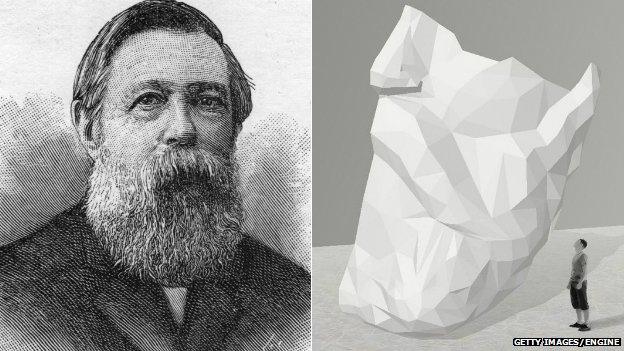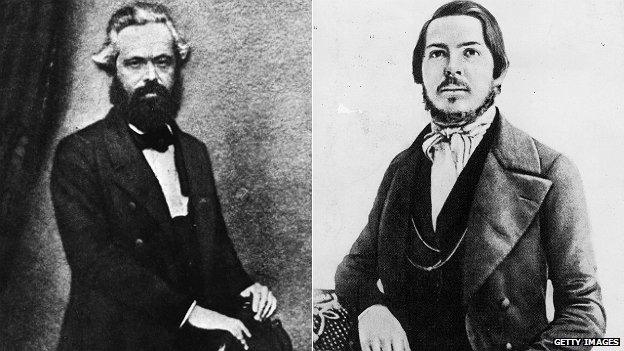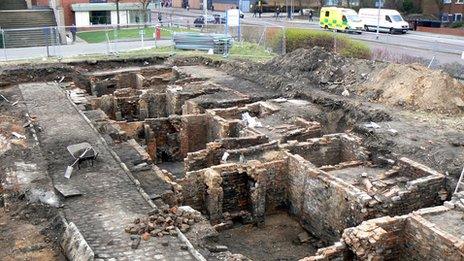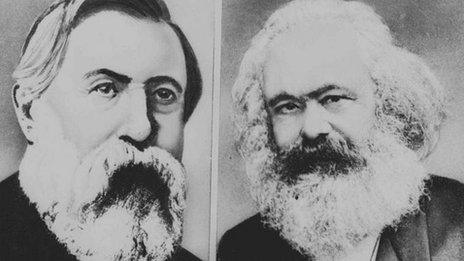Friedrich Engels' beard inspires climbing sculpture in Salford
- Published

Engine said the work depicted Engels' "signature magnificent beard as a symbol of wisdom and learning"
The "magnificent" beard of socialist thinker Friedrich Engels has inspired a climbing wall sculpture in Salford.
The 16ft (5m) beard statue - a "symbol of wisdom and learning" - will stand on the University of Salford's campus.
Arts company Engine, who are behind the piece, said the idea came from a 1980s plan to relocate an Eastern Bloc statue of the thinker to Manchester.
Engels, who wrote The Communist Manifesto with Karl Marx, lived in the area from the 1840s onwards.
The sculpture will depict the nose and whiskers of the father of Marxist theory and be situated on the university's Peel Park campus in 2016,
It features a climbing wall at the front, stairs to the rear and a viewing platform at the top, from which climbers can admire the view across Salford.
'Audacious' plan
Engine's Jai Redman said the work used Engels' "signature magnificent beard as a symbol of wisdom and learning", while the climbing aspect came from a desire to make it an "interactive piece".
"We're aren't interested in making 'a hero on horseback', [which is] something Engels would have been horrified by.
"Engels' Beard is a metaphor for how it is an effort and a struggle to pull ourselves out of ignorance [and] a direct representation of how all philosophers 'stand on the shoulders of giants'."

Marx and Engels in Manchester

Born in Prussia in 1820, Friedrich Engels arrived in England in 1842 to take up a role at the business his family co-owned in Salford, the Ermen & Engels cotton mill
He lived with an Irish woman, Mary Burns, who showed him the state of working class life in the area, leading him to write The Condition of the Working-Class in England in 1844
He stayed in Manchester on and off for the next 30 years, where he was a neighbour of author Elizabeth Gaskell
Karl Marx came to Manchester several times to visit Engels. The pair often met in Chetham's Library, where Marx also wrote part of his work Das Kapital

He said Engels had been chosen as "a great socialist, thinker and a philosopher, a local historical figure and a champion of the working classes", who dealt with issues still "alive and real" today.
"There is a huge issue in Salford and Manchester, where wage inequality and mass poverty is being seen on levels not experienced here since Engels' time."
The idea had come from an "audacious" plan to relocate a statue of the thinker to nearby Castlefield Basin in the mid-1980s, which "attracted broad support, but failed to materialise when no suitable sculpture could be found", he said.
'Bizarre and hilarious'
The plan was documented in former Hacienda DJ Dave Haslam's book, Manchester, England, where Redman first saw it.
He said that ever since, he had been waiting for "a good opportunity" to create the statue.
Haslam said the climbing wall was "bizarre and hilarious" but appropriate as "we should not be precious about Engels".
"Engels had a sense of fun. He used to go drinking in Manchester," he said.
"Landlords knew him and his friends, and he'd play jokes and get into scrapes."
The University of Salford's art curator Lindsay Taylor said she was "delighted that even before work has begun on Engels' Beard, it has engaged public imagination".
"All great art should provoke and encourage debate. It is entirely appropriate for the university as a place of learning to be involved with commissioning new art on educational subjects."
Engine said there were no plans to create an accompanying Karl Marx beard sculpture, but added they were "approaching authorities in Germany to perhaps site the other side of his face in Munich".
- Published2 March 2013

- Published6 April 2012
